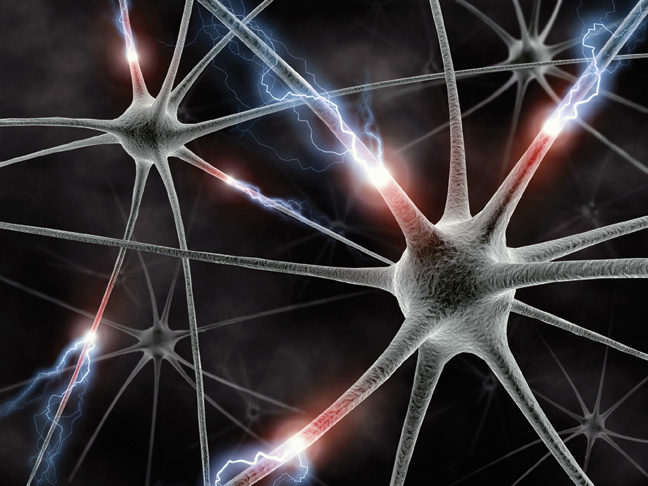The Boss. Command Central. The Human Computer. We have many analogies for the brain and each emphasizes an important point: this vital organ controls everything about us from our preferences to our movement to our morals.
Given the brain’s role in expressing who we are, consumers should take care to nourish this important organ so as to support cognitive health, proper attention and a healthy mood. Over the next several months, WholeFoods will devote a feature to each of these topics, with this month’s installment focusing on memory.
Inflammation and Oxidation
(Oxidative) stressed out. With each passing second, some 100 billion nerve cells in the brain (i.e., neurons) fire electrochemical signals through an intricate network of nerve fibers called dendrites and axons (1). This system is responsible for our every thought and movement, be they conscious or unconscious.
These important brain cells, like all the body’s cells, require oxygen. But, there’s a double-edged sword involved: this same nourishing oxygen can also damage neural cells via free radical oxidation (2). Such damage can be especially harmful to brain cells. States Angelica Vrablic, Ph.D., manager of nutrition research at Good ‘N Natural, Ronkonkoma, NY, “We have a limited number of brain cells. If cells are damaged by oxidation (free radicals) or inflammation, they may be lost forever.”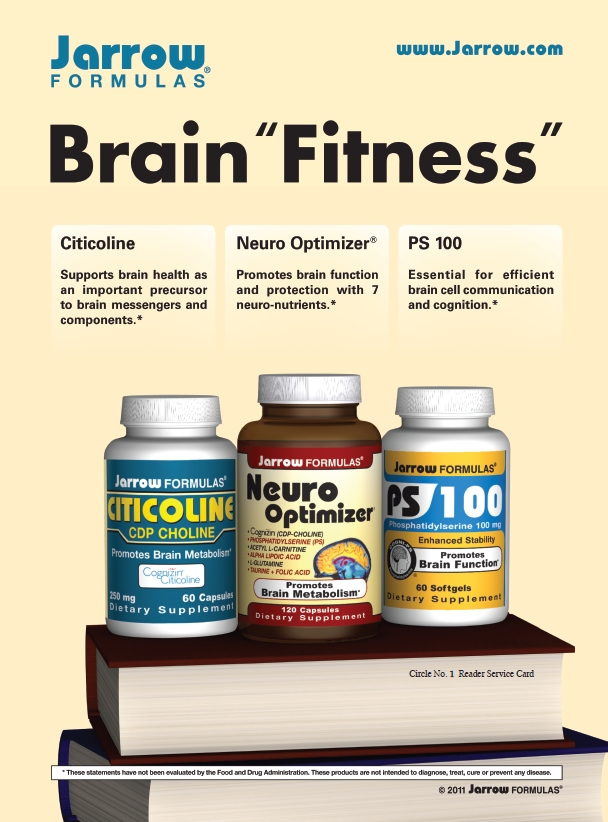
Also, the brain is comprised of 60% fat, according to Richard A. Passwater, Ph.D., Solgar Research & Development, Leonia, NJ, with 25–35% coming from DHA. “The brain is rich in DHA, a highly polyunsaturated fatty acid, which is very prone to oxidation,” Passwater states. “Most of the dry weight of the brain is lipid (fat) because brain activity depends greatly upon the functions provided by lipid membranes.”
Such damage to the brain’s fats can be problematic over time, says Dallas Clouatre, Ph.D., new product development and marketing consultant for Jarrow Formulas, Inc., Los Angeles, CA. “Oxidative stress, especially peroxidation, which is to say, damage to fats, typically is higher in those with Alzheimer’s disease and vascular dementia (3).”
There’s more to be concerned about regarding the cellular health of neurons and oxidation. The body manufactures phosphatidylserine (PS) to build neural cell membranes that are fluid enough to let neurotransmitters pass through. The production of PS may slow down over time, partly due to free radical damage. Overall, “Proper membrane fluidity is vital to proper brain cell function,” Passwater points out. “Membrane fluidity is controlled by balancing DHA and PS with cholesterol.”
If PS isn’t replenished, brain health may be negatively affected over time. According to Clouatre, “Damaged cell membranes do not respond properly to nutrients or to various neurochemical signals.”
Sigalit Zchut, Ph.D., director of research and development for the Division of Bio-Active Ingredients at Enzymotec, Ltd., headquartered in Israel with U.S. offices in Morristown, NJ, agrees, saying, “These changes in the membrane function may lead to damage to nerve cells in the brain and to the inevitable consequences leading to cognitive dysfunction.”
In addition to PS and DHA in the brain, there are other specific components in this organ that make it particularly susceptible to oxidative damage. For instance, neural cells’ mitochondria generate the energy stores needed for them to survive. Says Clouatre, “One theory is that aging of our brains reflects the generation of free radicals in the mitochondria resulting in damage to the mitochondria leading to reduced capacity to generate energy and to support energetic processes.”
The role of mitochondria is so important that some experts feel that if these cellular structures sustain too much oxidative stress, it may contribute to neurological diseases like Alzheimer’s or Parkinson’s diseases (4).
While oxidation is a natural process and cannot be avoided, it can be controlled.
Fog Fighters
Many experts believe antioxidants are key to brain health because of their role in warding off free radical damage to the neural cells. Since antioxidant levels decrease as we grow older, “the aging brain appears to be an easy target for oxidative damage. This underscores the importance of getting enough antioxidants through diet and supplements,” experts say (2).
“Antioxidants and magnesium are key nutrients needed to protect the brain from chemicals called excitotoxins, such as MSG, which are damaging to brain cells when levels of various nutrients are insufficient to control them,” says Neil E. Levin, CCN, DANLA, nutrition education manager for NOW Foods, Bloomingdale, IL. “The physical damage to brain cells that can be caused by oxidation, sometimes in the form of a bio-electrical spark causing a chain reaction that rips electrons from a string of innocent cells until an antioxidant ‘electron donor’ puts an end to it, can be prevented or 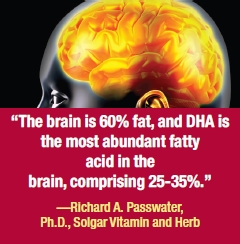 stopped by antioxidants. Antioxidants also protect fats from oxidizing (going rancid), and since the brain is nearly half fat it is dependent on both fatty acids and antioxidants to protect its structural integrity.”
stopped by antioxidants. Antioxidants also protect fats from oxidizing (going rancid), and since the brain is nearly half fat it is dependent on both fatty acids and antioxidants to protect its structural integrity.”
One important antioxidant, says Levin, is vitamin E. “Vitamin E and its related compounds (the tocotrienols) have been shown to protect neurons (brain and nerve cells) from being damaged or even killed off by excitotoxic chemicals,” he states, adding, “The antioxidant benefits of this essential vitamin’s ‘family’ of compounds also help to prevent oxidative reactions that can damage brain tissues.”
Continuing in the antioxidants arena, research indicates that anthocyanins (the dark pigments found in berries) may “protect vulnerable neurons and enhance the function of existing neuronal structures, two processes known to be influenced by flavonoids and also known to underpin neurocognitive function” according to recent research (5).
And, Passwater believes Pycnogenol (a branded ingredient from Natural Health Science) “helps fight cell-damaging free radicals that can contribute to oxidative stress, which in turn can contribute to the premature aging of cells.”
 Vitamin C, too, can play a role in brain health support. According to Levin, “Vitamin C directly pumps excitotoxins from neurons, protecting the brain and nerve cells from being damaged by these potentially toxic chemicals.” He says a patent-pending vitamin C antioxidant complex (Transport C-PLUS) may be especially beneficial because it may enhance vitamin C absorption and recycling. “The specific mechanism of action covered in the patent implies a benefit for several populations with impaired ascorbate absorption including those with poor insulin sensitivity, those with gut inflammation, those who take aspirin, and those on low sodium diets; all situations where normal vitamin C uptake and utilization is often suboptimal,” says Levin.
Vitamin C, too, can play a role in brain health support. According to Levin, “Vitamin C directly pumps excitotoxins from neurons, protecting the brain and nerve cells from being damaged by these potentially toxic chemicals.” He says a patent-pending vitamin C antioxidant complex (Transport C-PLUS) may be especially beneficial because it may enhance vitamin C absorption and recycling. “The specific mechanism of action covered in the patent implies a benefit for several populations with impaired ascorbate absorption including those with poor insulin sensitivity, those with gut inflammation, those who take aspirin, and those on low sodium diets; all situations where normal vitamin C uptake and utilization is often suboptimal,” says Levin.
There are also several options outside of antioxidants. For one, acetyl l-carnitine has much research support for maintaining mitochondrial health. According to Vrablic, “Scientific studies show that acetyl l-carnitine promotes brain metabolism, memory and cognitive function, especially mild memory problems associated with aging.”
According to Clouatre, acetyl-L-carnitine may be “the only nutrient that has been shown to rejuvenate the membrane of the mitochondria.”
One researcher, Bruce N. Ames, Ph.D., fed aged rats high levels of acetyl carnitine and lipoic acid and found a reversal of mitochondrial decay. The two nutrients “complement each other, in some cases synergistically, and restore the lost mitochondrial function to the level of young mitochondria” (6). Of note, acetyl carnitine and lipoic acid also restored lost cognitive function, the researcher claimed. 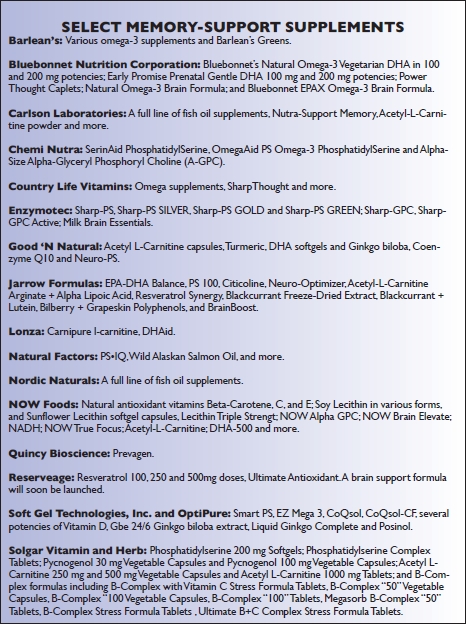
There may also be a connection between acetyl-l-carnitine and Alzheimer’s, which will be discussed later.
Also for mitochondrial health, some believe a combination of acetyl-l-carnitine and alpha-lipoic acid is important. Clouatre adds that CDP choline was shown in studies to reactivate “mitochondrial ATPases and the Na+/K+ ATPases when this compound is employed.” The end result may be improved blood flow and neuroimmune responses.
Phosphatidylserine (PS) is also an important natural nutrient that can be taken as a brain-nourishing supplement. According to Passwater, “Studies have shown that supplementation with 300 mg of PS per day helps improve memory.” The reason why, he says, is that PS “stimulates the production and release of the neurotransmitters acetylcholine, norepinephrine, serotonin and dopamine. It also speeds neuronal transmission by increasing the permeability of cell membranes,” according to Passwater. In a nutshell, PS facilitates the function of receptors on neural cell membranes and helps promote proper cell–cell communication. PS (the integrity of which is supported with antioxidants) also benefits cellular health by controlling cell growth and stabilizing cells’ inner environments.
These combined attributes of PS are key for proper brain health over time. In fact, animal studies indicate that PS helps prevent age-related decline. “These studies help to explain the clinical effects found in humans,” Clouatre says. “Of special interest, tests of the electrical signal strength associated with memory function indicated that PS reversed the loss of signal which marks memory decline. Human trials have demonstrated memory improvement, improvements in lucidity, in outlook upon life, and in the general ability to cope with the concerns of the day and to function socially.”
According to Zchut, PS often works effectively with other natural compounds like soy and DHA. “Lower levels of phospholipids–DHA in the brain were clinically associated with the decline in a variety of cognitive functions, cognitive impairments and neuropsychiatric disorders, including memory decline, dementia, depression, neuro-developmental disorders such as dyslexia and autism, and attention deficit and hyperactivity disorder. Also, reduced levels of phospholipid-related DHA were connected to increased risk of Alzheimer’s disease,” he says.
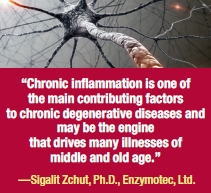 Zchut speaks of a human clinical trial conducted by his company. In the study, 157 older individuals with memory problems (but not dementia) were given 300 mg of PS–DHA for 15 weeks. Researchers felt the combination improved cognitive function.
Zchut speaks of a human clinical trial conducted by his company. In the study, 157 older individuals with memory problems (but not dementia) were given 300 mg of PS–DHA for 15 weeks. Researchers felt the combination improved cognitive function.
DHA is, of course, recommended on its own, too, for optimal brain health. According to Jonny Bowden, Ph.D., CNS, scientific advisor to Barlean’s, Ferndale, WA, “Omega-3s help the cell membrane, improve mood and improve the ability of cells to ‘talk’ to one another via neurotransmitters.”
The research behind the benefits of DHA for memory (and overall brain health) is vast. One of the more recent published studies on the topic, the “Memory Improvement with Docosahexaenoic Acid Study (MIDAS),” showed DHA improved cognitive functions in healthy older adults with age-related cognitive decline after six months (7).
Let’s revert back to a point made by Passwater about PS’s benefits for stimulating the production and release of acetylcholine. This neurotransmitter (made by cholinergic neurons by synthesizing choline and acetyl coenzyme A) plays an important part in movement, learning, memory and mood. For a chain of nerve signals to occur, acetylcholine must spread to nearby neurons; but, it can only be released from a receptor if concentrations of acetylcholine at the synaptic cleft are low. Having extra acetylcholine in this area may cause neurons to misfire. So the body uses acetylcholinesterase to remove extra acetylcholine and maintain low concentrations of this neurotransmitter (8). It’s important to note that some Alzheimer’s drugs actually work by inhibiting acetylcholinesterase, working on the theory that such patients aren’t producing enough acetylcholine for proper neural function (more on this enzyme later).
Another phospholipid, glycerophosphocholine (GPC), is involved in the formation of acetylcholine, says Zchut, noting that GPC also is a precursor for phospholipids in neural membranes. Since cognitive decline may be linked to a lessening of acetylcholine levels, boosting them through GPC supplementation may be beneficial. States Zchut, “GPC was shown to significantly benefit attention, mental focus, recall and other higher cognitive functions, including in young healthy subjects.”
Other suggestions for brain health include the B-vitamins, astaxanthin and other carotenoids.
But before beginning a supplement regiment, Levin reminds us to have shoppers check with their healthcare provider first.
The Big Question: Can I Prevent Alzheimer’s?
Going up inflamed. Steve Holtby, president and CEO, Soft Gel Technologies, Inc., Los Angeles, CA, points out that controlling oxidative damage isn’t just about antioxidants; it’s also about addressing inflammation caused by the body’s response to oxidative stress. He explains that in response to stress, our white blood cells send “defensive compounds” (e.g., cytokines and interleukins) to areas where stress occurs. In many respects, this inflammation is an important survival mechanism; but when chronic inflammation occurs, it can be damaging and must be addressed to support proper health.
Certain nutrients—like the omega-6 fatty acid linoleic acid (which converts to arachidonic acid [AA])—feed inflammatory compounds. The COX-2 enzyme converts AA to prostaglandin E2 (PGE2) and to the cytokines interleukin-1 (IL-1), interleukin-6 (IL-6), and tumor necrosis factor alpha (TNFa), all of which trigger the release of free radicals and promote inflammation, says Holtby.
“And not just the common inflammation many experience in a knee or shoulder, but also inflammation throughout the body, even in the brain of an Alzheimer’s sufferer,” Holtby explains, noting that a diet that is too high in omega-6 fatty acids and too little antioxidants contributes to chronic inflammation. Evidence suggests, he says, that “unchecked activity of the COX-2 enzyme” is the cause of numerous diseases, including Alzheimer’s.
Markers of inflammation have been recorded in the brains of Alzheimer’s patients. Says Bowden, “When there’s oxidative damage, rogue molecules called free radicals attack your cells (and DNA), interfering with the cells ability to communicate and function optimally. All of this can have a profound effect on brain function, including memory, learning and thinking.”
Alzheimer’s disease is a form of dementia that worsens over time and can seriously impair one’s memory, mental clarity and behavior. What may start out as harmless forgetfulness can progress into language problems, forgetting current events or even one’s own history (like the names of family members).
Unfortunately, there is no treatment for Alzheimer’s—be it through natural or pharmaceutical means. And the causes are not known well enough to prevent it, though one’s age and family history are risk factors.
Again, if shoppers are concerned with preventing this debilitating disease, retailers must explain that there’s no magic pill that will accomplish this task. Nonetheless, there are some ways to support brain health from a nutritional standpoint that are very promising when looking at physical markers of Alzheimer’s patients. “Starting on supplements that support brain wellness and memory before problems begin is a great idea. Alzheimer’s is an irreversible condition, so once the damage is done, all you can do is slow the progression,” states Rob Maru, vice president of innovation at Reserveage Organics, Gainesville, FL, “Taking brain supplements for prevention makes so much sense.”
Oxidation explanation. We’ve already learned about how oxidative damage can be harmful to a healthy brain over time. Trisha Sugarek, BS, MS, national educator and R&D specialist for Bluebonnet Nutrition Corporation, Sugar Land, TX, underscores a connection between such damage and dementia: “When oxidative stress occurs in the brain, it can wreak havoc on the neuro system and has been implicated in the pathogenesis of neurodegenerative diseases as well as dementia.”
Clouatre points out that some experts believe that such neuroinflammatory oxidative stress and elevated levels of homocysteine in the blood may be a marker of cognitive decline (9). High homocysteine levels are also a risk factor for coronary heart disease. While research indicates that folic acid, vitamins B6 and B12 and other B vitamins help break down homocysteine in the body and reduce heart disease and stroke, Clouatre says “supplementation with B-vitamins to reduce homocysteine levels has not been shown to be effective in preventing cognitive declines in men over 75 who already exhibited hypertension. Findings imply that supplementation may be useful only in limited populations (10).”
Antioxidants, in general, seem to be a good choice for those concerned about maintaining brain health as we age. States Holtby, “It is hypothesized that increasing antioxidant levels in the organism might retard or reverse the damaging effects of free radicals on neurons.”
Of the many antioxidants available, Bowden singles out turmeric and quercetin (prevalent in apple skins), which he feels contains strong anti-inflammatory compounds. In a 2004 in vitro study, brain cells were exposed to hydrogen peroxide to simulate damage that could lead to Alzheimer’s. Cells treated with quercetin showed less damage (11).
Sugarek feels DMAE is important for maintaining sufficient amounts of the neurotransmitter acetylcholine. “Due to DMAEs unique structure, it is able to become part of the cell membrane, thereby making the cell membrane more resistant to stress. Furthermore, by acting as an antioxidant, it can neutralize free radicals prior to the damage they inflict on cells and tissues,” she states.
And, antioxidant coenzyme Q10 “appears to slow the progressive deterioration of function in [those with Parkinson’s disease],” Holtby states.
The plaque set-back. One area of increased interest in the Alzheimer’s research community is amyloid plaque that develops between neurons. In healthy individuals, such protein fragments are produced regularly and broken down. But in Alzheimer’s patients, the fragments accumulate and form hard plaques over time. States Maru, “Amyloid plaque build up in the brain also contributes to brain cell death, which will affect memory and recall.” He adds, “Many researchers believe that if we can prevent the plaques from forming in the first place, we can perhaps significantly reduce the incidence of Alzheimer’s and dementia.”
This may be the Holy Grail for Alzheimer’s researchers. Says Zchut, “It was the researchers’ hypothesis that by blocking the formation of this abnormal protein the pathology of the disease will be inhibited or reversed. It’s no wonder then that so many research groups concentrate their efforts on this subject. Obviously, finding a nutrient that will block beta amyloid formation will provide relief to millions of people all over the world.”
There are several nutritional supplements that are being studied for their ability to help on this front, though stores should be clear that no dietary supplements are proven to prevent or treat cognitive decline.
For instance, Maru states, “Resveratrol in particular has been shown to provide support for inflammation, as well as protect against oxidative stress.” In one study, researchers say resveratrol “markedly lowers the levels of secreted and intracellular amyloid-ß (Aß) peptides produced from different cell lines.” It doesn’t stop the production of these peptides; rather, it promotes their degradation through a mechanism that involves the proteasome. “These findings demonstrate a proteasome-dependent anti-amyloidogenic activity of resveratrol and suggest that this natural compound has a therapeutic potential in Alzheimer’s disease,” the researchers state (12).
Maru adds that flavanols, in general, may show promise as a way to address amlyoid plaque. He states, “Systemic enzymes such as NSK-SD Nattokinase have also shown promise in the ability to degrade amyloid plaque in vitro.”
Another antioxidant, vitamin E, has played an important role in discussions about nutrition and brain health—particularly with respect to Alzheimer’s disease. In 2010, an international research group compared individuals’ levels of vitamin E in the blood and Alzheimer’s incidence rates over several years. According to the team, those with the highest levels of vitamin E in the blood had less of a chance of developing the disease than those with the lowest levels of the vitamin in their systems (13). These results depended on the type of vitamin E: ß-tocopherol showed the highest association with low Alzheimer’s incidence rates, whereas ß-tocopherol, ß- tocotrienol and ß-tocotrienol only had a “marginally significant effect.”
Other research has connected DHA to improvements in brains riddled with amyloid plaque. Citing a 2008 animal trial (14), Sugarek notes that taking 300 mg/day of DHA for three months “was significantly protective at reducing oxidative stress in the cerebral cortex and hippocampus of the brain, increasing membrane fluidity, and preventing amyloid ß-peptide-induced impairment of memory function.”
Choline connection. Again, while supplements cannot be said to treat diseases, several nutraceuticals have shown promise in clinical trials for their use in memory support. Many have been tested in Alzheimer’s patients because of their effects on choline and acetylcholine levels.
Scott Hagerman, president and CEO of Chemi Nutra, White Bear Lake, MN, highlights alpha-glyceryl phosphoryl choline (A-GPC) for this purpose. Often prescribed in Europe as an Alzheimer’s disease drug (and only available in the States as a dietary supplement), A-GPC is said to improve memory, cognition and learning by increasing acetylcholine in the brain, according to WebMD.
States Hagerman, “There are, in fact, numerous published research studies that have shown that A-GPC works at least as well as acetylcholinesterase inhibitors, and probably better.” His company markets A-GPC as a dietary supplement ingredient, as a GRAS-approved food ingredient and as a pharmaceutical ingredient. He states, “This branded drug is sold in Europe and Asia, and it competes head-on against the world’s best-selling, branded, acetylcholinesterase inhibitor.”
Several experts point out that PS has been studied in Alzheimer’s populations. As we learned, PS helps regulate cell membrane fluidity, which is important for sending and receiving chemical messages. But Sugarek adds that PS “has demonstrated some usefulness in improving learning, memory and cognitive function by enabling brain cells to metabolize glucose and release/bind with neurotransmitters more effectively.” The way it works, she states, is by acting as a natural emulsifier to enhance cellular communication in the brain.
Another phospholipid, phosphatidylcholine, is a precursor to choline. According to Sugarek, “Choline…facilitates the communication between neuron (nerve) cells, thereby enhancing the brain’s ability to process, retain and retrieve information for healthy cognitive function.” Thus, supplementation with this phospholipid may help support healthy brain function.
Holty contributes a list of several memory-supporting nutrients he feels are important:
• PS, he says, has been shown in clinical trials to improve memory, concentration, word recall and mood in middle-aged and elderly subjects with dementia and age-related cognitive decline.
• Huperzine A may inhibit acetylcholinesterase, “thereby blocking the breakdown of acetylcholine (a brain chemical essential to memory) to choline,” he says. GPC is also said to be an acetylcholinesterase inhibitor.
• Acetyl-l-carnitine has shown to improve memory in those with Alzheimer’s disease better than a placebo. Mind Boosters author Ray Sahelia believes that Alzheimer’s patients may benefit from this nutrient in three ways: it “helps form the brain chemical acetylcholine; it keeps mitochondria working efficiently by clearing them of toxic fatty-acid metabolites; and it helps regenerate neurons damaged by free radicals” (15).
Other helping hands. Research has focused on herbs, too, for memory support. For instance Gingko biloba, well-known for its brain support capabilities, is widely used in Europe for treating dementia. It is said to protect nerve cells that are damaged in Alzheimer’s disease patients. Some feel that this herb is as effective as prescription drugs for delaying dementia symptoms (16).
The bacopa extract is said to improve brain function and learning; one 12-week study found that taking 300 mg of bacopa daily improves cognition in healthy individuals (17). According to Holtby, “Bacopa leaves contain steroidal saponins of which bacosides have the ability to enhance nerve impulse transmission and thereby strengthen memory and general cognition.”
It may also be, as researchers are discovering, that combinations of several of the aforementioned nutrients may work in concert to support proper memory function as we age. Last year, a study conducted on folic acid, vitamin B12, vitamin E, samE, n-acetyl cysteine and acetyl-l-carnitine “significantly” improved cognitive performance in a three-month trial of subjects who were older than 74 (18).
And, Zchut speaks of combinations of PS with soy that were found to “turn back the aging process” in studies. He explains that after taking 300 mg/day of Soy–PS for three months, subjects with memory loss were better able to learn and remember names and written information. “The ‘reversal’ effects of the aging process amounted to nearly 14 years,” he states. Other studies show benefits for the combined use of PS and DHA.
Another unique supplement is said to support memory caused by neuronal calcium imbalance. This jellyfish derived supplement (Prevagen from Quincy Bioscience) makes use of the apoaequorin calcium-binding protein. Says the company, “The relationship between intracellular calcium imbalance and age-related cognitive decline is well established.” In one study, this supplement reduced errors during cognitive testing by 29%.
Time Is of the Essence
As in many aspects of health, experts stress that prevention is the best medicine for memory support. States Passwater, “Loss of brain cell function is a gradual process and people tend not to take action until they have a problem. However, it is never too late.”
Vrablic agrees noting, “We know that memory function declines with age, so I suggest to supplement for memory health as soon as possible.” WF
References
1. National Geographic, http://science.nationalgeographic.com/science/health-and-human-body/human-body/brain-article.html, accessed Feb. 12, 2011.
2. The Franklin Institute, “The Human Brain: Miconutrients,” http://www.fi.edu/learn/brain/micro.html, accessed Feb. 12, 2011.
3. K. Gustaw-Rothenberg, K. Kowalczuk and M. Stryjecka-Zimmer, “Lipids’ Peroxidation Markers in Alzheimer’s Disease and Vascular Dementia,” Geriatr. Gerontol. Int. 10 (2), 161–166 (2010).
4. M.P. Mattson, et al., “Mitochondria in Neuroplasticity and Neurological Disorders,” Neuron, 60 (5), 748–766 (2008).
5. B.N. Ames, www.bruceames.org, accessed Feb. 12, 2011.
6. K. Yurko-Mauro, et al., “Beneficial Effects of Docosahexaenoic Acid on Cognition in Age-Related Cognitive Decline,” Alz. Dement., 6 (6), 456–464 (2010).
7. J.L. Powers, “Acetylcholine,” www.chemistryexplained.com/A-Ar/Acetylcholine.html, accessed Feb. 17, 2011.
8. J.P. Spencer, “The Impact of Fruit Flavonoids on Memory and Cognition,” Br. J. Nutr. 104 (Suppl. 3), S40–47 (2010).
9. A. McCaddon and P.R. Hudson, “L-methylfolate, Methylcobalamin, and N-Acetylcysteine in the Treatment of Alzheimer’s Disease-Related Cognitive Decline,” CNS Spectr. 15 (1 Suppl 1), 2–5 (2010).
10. A.H. Ford, et al., “Vitamins B(12), B(6), and Folic Acid for Cognition in Older Men,” Neurol. 75 (17), 1540–1547 (2010).
11. Fisher Center for Alzheimer’s Research Foundation, “An Apple a Day for Alzheimer’s,” www.alzinfo.org/01/articles/prevention-and-wellness-109, accessed Feb. 16, 2011.
12. P. Marambaud, H. Zhao and P. Davies, “Resveratrol Promotes Clearance of Alzheimer’s Disease Amyloid-β Peptides,” J. Biol. Chem. 280, 37377–37382 (2005).
13. F. Mangialasche, et al., “High Plasma Levels of Vitamin E Forms and Reduced Alzheimer’s Disease Risk in Advanced Age,” J. Alz. Dis. 20 (4), 1029–1037 (2010).
14. M. Hashimoto, et al., “Docosahexaenoic Acid Disrupts In Vitro Amyloid Beta(1-40) Fibrillation and Concomitantly Inhibits Amyloid Levels in Cerebral Cortex of Alzheimer’s Disease Model Rats,” J. Neurochem. 107 (6), 1634–1646 (2008).
15. D. Veracity, “How Acetyl-L-Carnitine Prevents Alzheimer’s Disease and Dementia While Boosting Brain Function,” Dec. 7, 2005, www.naturalnews.com/015553.html, accessed Feb. 17, 2011.
16. University of Maryland Medical Center, “Ginkgo Biloba,” www.umm.edu/altmed/articles/ginkgo-biloba-000247.htm, accessed Feb. 16, 2011.
17. University of Maryland Medical Center, “Dementia,” www.umm.edu/altmed/articles/dementia-000046.htm, accessed Feb. 16, 2011.
18. A. Chan et al., “A Vitamin/Nutraceutical Formulation Improves Memory and Cognitive Performance in Community-Dwelling Adults without Dementia,” J. Nutr. Health Aging, 14 (3), 224–230 (2010).
Published in WholeFoods Magazine, June 2011

